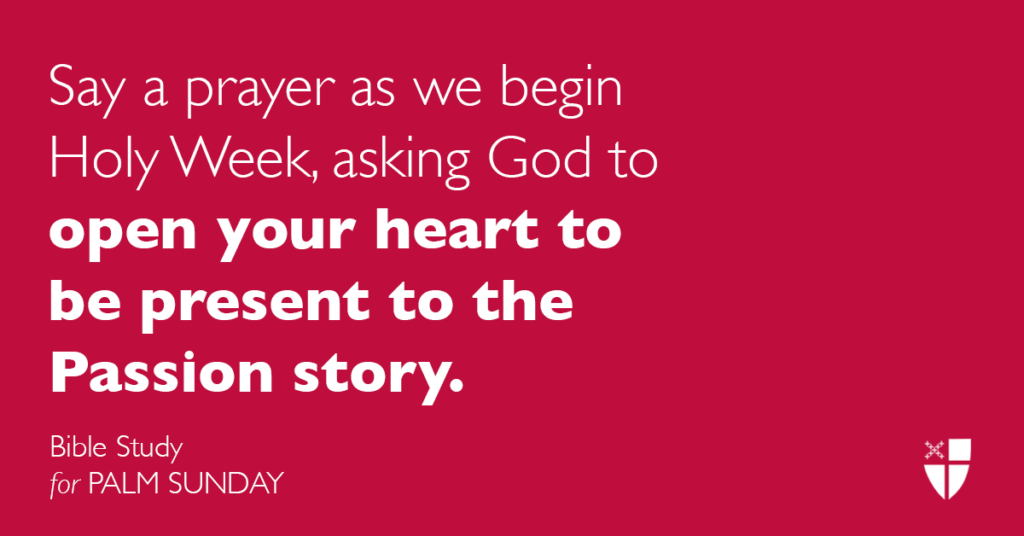This page is available in: Español
Bible Study: Palm Sunday (B) – 2021
March 28, 2021
RCL: Isaiah 50:4-9a; Psalm 31:9-16; Philippians 2:5-11; Mark 14:1-15:47 or Mark 15:1-39, [40-47]

Isaiah 50:4-9a
This passage is from what scholars call “Second Isaiah,” written while the people of Israel were living in exile in Babylon. This text is one of the “servant songs,” speaking of God’s servant, called to gather the exiled people back together and restore Zion. In these songs, sometimes the servant seems to stand for all of Israel, and sometimes the servant seems to be describing an individual person. Christians have long read these texts as pointing toward Christ, but this is certainly not the only way to approach them, even for us as Christians.
The speaker in this passage talks about God who “wakens my ear” and “has given me the tongue of a teacher,” allowing the speaker to listen to God’s word and tell it to others. But servanthood has consequences – the servant has to endure violence, insults, and disgrace for telling God’s truth. This is what Dietrich Bonhoeffer has called the “cost of discipleship,” and it continues to ring true in our present times, where fighting inequality and injustice is incredibly hard, and can lead to painful divisions.
- Where are the servants you look to in these times, who set their “face like flint” and do the hard work of truth-telling and justice-making?
- What are the difficult truths to which you are being called to waken your ear? And where are you being called to speak out?
Psalm 31:9-16
The psalmist is pleading with God for help with his suffering. This is a very physical feeling of sorrow and grief, felt in the pray-er’s throat and belly, making him sigh out loud, and consuming his bones. The pray-er is afraid others are talking about him and plotting against him. But perhaps even worse, he feels “forgotten like a dead man” and “useless as a broken pot.” In addition to his difficulty and grief, he is also experiencing the pain of isolation.
Many of us can relate to feeling disconnected, alone, and even forgotten during this time. People have had to endure staying in hospitals and nursing homes without loved ones by their sides. Most of us have felt lonely at times, without the usual close interactions we had before the pandemic. Reading a psalm like this can provide comfort when we feel alone in our suffering, allowing us to name our feelings, to know that people have been experiencing the same things for thousands of years, and letting us give our sorrows to God.
- Where are you grieving or sorrowing right now?
- Are you able to ask God to come near and shine his face on you?
Philippians 2:5-11
Paul writes his letter to the church in Philippi, in northern Greece, from prison. He is trying to unite these church members, urging them to put aside their differences. To illustrate this, he quotes a very early Christian hymn in this passage, which tells of Christ’s complete self-emptying, or kenosis. This concept of self-emptying has been wrongly used against the marginalized and oppressed – to subdue enslaved people or to prevent those in domestic abuse situations from leaving their abusers. But here, Paul is really speaking to the strong among his congregation, exhorting them not to elevate themselves over the weaker members. At different times and places in our lives, we may be in the strong or the weak position. The self-emptying of Christ happened from a position of power – equality with God – and is a reminder to us to not boast, feel superior, or exploit those of lesser advantage when we hold the power.
- What pride or grudges or other negative feelings do you need to empty yourself of today?
- How can Jesus’ example of humility give you courage to reach out to others in humility? Try reading this passage slowly out loud, meditating on Christ’s self-giving.
Mark 14:1-15:47
Here in Mark’s Gospel, we see Jesus’ servanthood, his total obedience to God, in action. Mark’s telling of this story is unsentimental, vivid, fast-paced, and horrifying. In this earliest-written gospel, the trauma of the violent destruction of Jerusalem and the Temple by Rome in 70 CE was still fresh and is reflected in the haunted tone of the narrative.
The disciples betray and deny Jesus. They abandon him when he needs them. Jesus cries out on the cross, quoting Psalm 22, an even more anguished psalm than the one appointed for today. The women around Jesus are the ones shown as able to accompany their teacher in his march to the cross. A woman anoints his head, as kings were traditionally poured with oil, and as bodies were anointed for burial. Jesus’ women followers stand as witnesses near the cross and tomb. As we begin this Holy Week, we will have the opportunity to enter into the Passion story ourselves. Will we be more like the disciples or more like the women?
- Say a prayer as we begin Holy Week, asking God to open your heart to be present to the Passion story. Let whatever emotions come up and accept them, knowing that Christ is with you on this weeklong journey.
- What pains and burdens are you being asked to leave behind as you travel with Jesus? Where are you invited to look with compassion, to others who are suffering in your neighborhood and in the world now?
This page is available in: Español
Don’t forget to subscribe to the Sermons That Work podcast to hear this sermon and more on your favorite podcasting app! Recordings are released the Thursday before each liturgical date.
Receive Free Weekly Sermons That Work Resources!
This page is available in: Español


